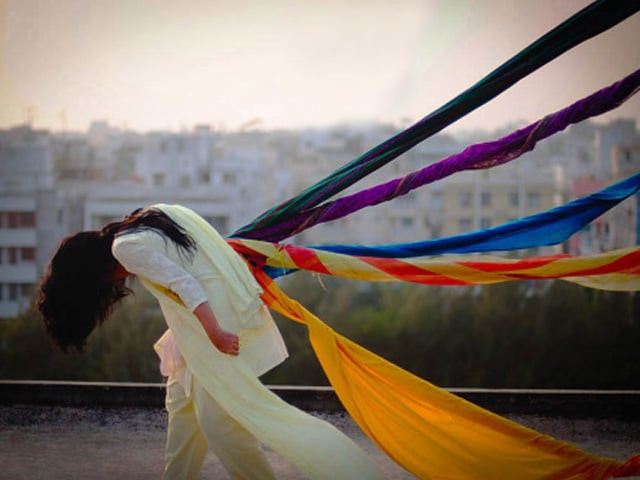So, Nusrat would wake up at 5am.
At 4am.
At 3:30am.
All to see the sun that rose so elegantly into the dewy mornings of October.
But she never could.
She never could stay tuned to the games of the sun, for the sun was a hopeful deity, and Nusrat’s hope was nonexistent now.
So every morning, Nusrat would run with urgent footsteps to the balcony, requesting the sun to wait for her. And after being disappointed, she would go back in and answer all the yells of her mother, then all those of her father, and in turn fetch her dupatta before beckoning a goodbye and leaving for the Jamal Manzil. This was repetitive. For weeks, maybe even more than a month, Nusrat had been going to Jamal Manzil. Amma said it was her ‘job’ while Abba called it her ‘responsibility’. Hence, Nusrat complied.
It was 5:45am when she woke up on a Tuesday morning. Amma was cursing repeatedly somewhere in the little shed which they called a house. Nusrat jumped. She was late for Jamal Manzil.
Where was her dupatta?
If she walked out onto the street without it, Abba would break her legs. His ghairat (honour) lay before his daughter. One movement of the dupatta in the wind and Abba would drag her through the streets by her hair.
“Shukkar (Thank God),” Nusrat breathed a prayer of gratitude as she spotted it behind her cupboard. “I’m leaving, Amma.”
“Make sure Ma’am Jamal doesn’t complain about you later on. It has happened before, and if it happens again, don’t bother returning.”
Nusrat sniffed in acceptance. This was routine.
She walked out into the open. She hadn’t walked more than a couple of yards before she heard a high-pitched yell behind her back. It was Abba. He pulled on her braid and smiled at her. Her Abba had come to drop her off. Nusrat walked. She was a girl walking into her own destiny, a destiny that her Abba directed.
She thought of the new slippers Jamal Sahib had bought her. She would wear them tomorrow; the walk was too long and too painful for the old, battered slippers she was wearing today.
When they reached Jamal Manzil, Nusrat was still thinking of her new slippers and road stones. She strolled to the front door and turned the knob. Her day had started – there would be washing, cleaning, followed by more washing and further chores.
“Kaam waali!”
(Maid!)
Nusrat turned around at the call. It was none other than Jamal Sahib who had called. According to Amma, he is the sole reason for the fulfilment of her hunger before night time.
Eyes plastered to the floor, she stared at her shoes. He was saying something she could not pay attention to, seconded by Abba every now and then. Nusrat just stared at the ground. She imagined standing in a field of sunflowers; her grubby feet would be in contact with the grass and her ears would be listening to the whispers of the sun, the hope she could not touch or know but could feel. But there was no sun here.
Sahib handed crispy notes to Abba and turned back to her again.
“Come on, you beautiful girl,” he said. “I’ll show you something you never have seen before.”
Nusrat lifted her face and met his eyes. Brown to black. Innocent to predatory. Virgin to impure. His eyes were the darkest black, like the skin of a Hydra straight out of hell. He wheezed, whined, made compliments about Nusrat’s skinny legs and knobbly knees. Then he told her to come with him.
Payment first, then favour.
That was his way.
This time he paid her with his son’s entire toy basket.
As he bustled her along, Nusrat turned her head around and looked at the receding steps of the dirty white shoes exclusive to Abba. Even as she passively allowed the Sahib to direct her feet and hold her hands, she looked back at Abba.
One word? One hint of disapproval?
None.
She sifted through the toys Sahib offered her. They were all used, all played with a thousand times before. She was yet another one of them. How many Sahibs had there been?
Ma’am Jamal called in that moment and the Sahib left quickly, leaving no trace of him having been there, except the Barbie doll and the inescapable disgust he had handed to Nusrat. Her hands roamed around the rough hair of the Barbie doll. It was just Barbie and her, sitting together in the dirt of a hot summer street.
The madam’s children came outside in a while, and took back the Barbie, for who would give a Barbie to a kaam waali (maid)? Not them in the least, or any of the thousands of elite children that lived and breathed in the same city. And Nusrat surrendered the Barbie. She surrendered her childhood. She surrendered all that was pure and all that was valuable.
Then she walked home. As her feet hit the road, she realised she was missing her dupatta. And she halted in her tracks, remembering the moment at which she had stared at the Barbie, realising that its eyes weren’t blinking, and she had recognised her own reflection in the misty little eyes that looked like the shiny exteriors of a couple of dead beetles, burnt down by the hopeful sun.
Wednesday morning, she woke up again, this time late. The sun had gone up a while ago, and she did not run to the balcony. She didn’t even grab her dupatta. It had been tied around her stomach the night before, so she wouldn’t forget it. Nusrat looked at Abba sleeping soundly in his bed. Then she turned around and left for Jamal Manzil.



COMMENTS
Comments are moderated and generally will be posted if they are on-topic and not abusive.
For more information, please see our Comments FAQ